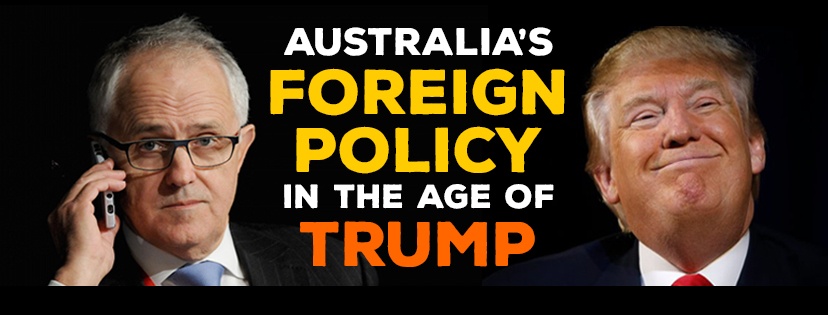Since the presidential election, the eyes of the world have been on the White House … particularly troubling are the global implications – how well will the US Eagle relate to the Dragon, not to mention the Bear. Are we now in a new volatile and a particularly dangerous era of uncertainty and instability. It is not like there aren’t enough problems around the world beforehand anyway, with global climate change, warfare, terrorism, massive flows of refugees, the continuing aftershocks of the global financial crash, extreme inequalities growing between and within nations?
So the question in Australia is how do we best respond to this situation. the Australian government, as you know, has been working on a Foreign Policy White Paper, many NGOs and individuals have made submissions, but as in the note, advertising tonight’s meeting pointed out it is sometimes seen that the government is not really that interested in this sort of public consultation process. It is not clear whether DFAT even wanted to hear from the public and the process has been very constrained by the start. However, there are alternative voices in the debate on foreign policy in Australia and they deserve to be heard.
It is an important moment where these organisations have come together, begun discussions within the frame of pursuing economic justice internationally and trying to find ways to work together within the Australian context. To put a critical voice out there, much needed as we drift into Trump’s orbit. What is encouraging from the current situation is that the public is not passive on these issues, whilst we are not seeing any major protest on foreign policy at the moment, the public is not behind the US Alliance …”
“There is very little support around Australia’s foreign aid program not because people disagree with humanitarian aid, quite the opposite, 75% of the population support aid for humanitarian purposes because most people disagree with using aid for Australian commercial or security purposes. Only 12% of the population in a poll conducted by ANU a couple of years ago said they supported using aid for Australian commercial and security purposes. The governments’ current paradigm, what they call the new paradigm of Australian foreign policy and of Australian aid which is simply to pursue Australian interest is not supported by the bulk of the population.”
“We can think of a positive agenda, of course, no longer backing US illegal interventions, quite simple and I think that is perhaps the most important aspect. Having a strong and responsible climate policy reflecting Australia’s place in the world. Not having trade agreements that are geared to corporate interests but are geared to workers, to the environment, to peoples interest. Having Asylum Seeker and Refugee policy that respects the rights of people to seek protection in Australia. And of course, finally, a positive overseas aid program, one that does address the structural causes of economic injustice on the world stage. One that is not simply about pursuing Australia’s interests as it is currently.

